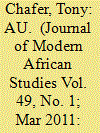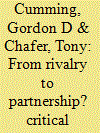|
|
|
Sort Order |
|
|
|
Items / Page
|
|
|
|
|
|
|
| Srl | Item |
| 1 |
ID:
102399


|
|
|
|
|
| Publication |
2011.
|
| Summary/Abstract |
At their 1998 Saint-Malo summit, the UK and French governments promised to set aside a century of rivalry and cooperate more closely on Africa. They also signalled their intention to develop a continent-wide focus on Africa, which would include building up the capacity of regional organisations. They were helped in this latter goal by the winding up of the OAU and its replacement by the AU in 2002. This article therefore examines the extent and nature of Anglo-French cooperation vis-à-vis the AU. It sets out briefly the history of UK and French neglect of the OAU, reviews the key developments that pushed for a more coordinated stance on the AU, and then - drawing on extensive interviews in London, Paris, Brussels, Addis Ababa and Dakar - evaluates the extent of Anglo-French cooperation. It concludes by noting the uneven nature of Anglo-French cooperation vis-à-vis the AU and assesses the reasons for this.
|
|
|
|
|
|
|
|
|
|
|
|
|
|
|
|
| 2 |
ID:
108607


|
|
|
|
|
| Publication |
2011.
|
| Summary/Abstract |
Against the background of conflict in the Great Lakes Region, the UK and France promised, at their 1998 Saint-Malo summit, to set aside rivalries and cooperate on Africa. In subsequent Anglo-French gatherings, they singled out the DRC and pledged to work together there to promote peace and tackle poverty. This article asks whether this coordination took place and whether it involved a 'deconflictualisation' of approaches, 'coincidental' cooperation, or 'sustained and reciprocal' collaboration. It looks for evidence of institutionalisation of UK-French ties and policy cooperation in the fields of peacebuilding and poverty reduction. It then identifies the pressures for, and barriers to, collaboration, focusing particularly on the role of interests, foreign policy norms, institutional factors and resource constraints. It concludes by setting out the wider implications of UK-French cooperation and the limited prospects of closer future collaboration.
|
|
|
|
|
|
|
|
|
|
|
|
|
|
|
|
| 3 |
ID:
108509


|
|
|
|
|
| Publication |
2011.
|
| Summary/Abstract |
At the December 1998 Saint-Malo summit, Britain and France promised to set aside past rivalries and work together on African issues. While brief indications were given as to possible areas of bilateral and 'bi-multi' cooperation, the terms and scope of this 'partnership' were not spelt out. Was this to involve only sporadic collaboration? Or was it to be an institutionalised partnership, such as the Franco-German tandem, or perhaps a more intuitive alliance, such as the Anglo-American 'special relationship'? These questions are central to this article, which begins by showing how Anglo-French relations in Africa were largely marked by rivalry from the colonial era to the early post-Cold War period. Drawing upon extensive interviews, it demonstrates how, over the last decade or so, closer linkages have developed between the UK and French administrations and how there has been a greater degree of cooperation in response to the key challenges of Africa. It then uses a neo-classical realist framework to explain the readiness or reluctance of Britain and France to collaborate on Africa. It concludes by suggesting that, while there has been progress in 'deconflictualising' African policies, cooperation has been, and is likely to remain, limited.
|
|
|
|
|
|
|
|
|
|
|
|
|
|
|
|
|
|
|
|
|